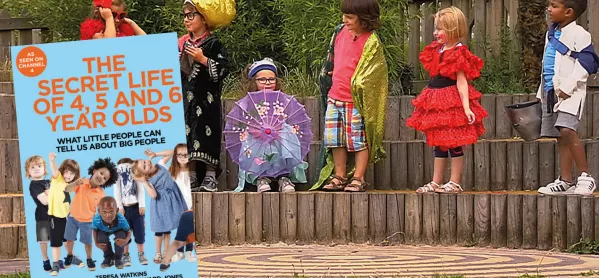- Home
- Book review: The Secret Life of 4, 5 and 6 Year Olds
Book review: The Secret Life of 4, 5 and 6 Year Olds

If you’ve ever watched the Channel 4 series The Secret Life of 4, 5 and 6 Year Olds, you will understand the truth of the saying “kids make great copy”. The hidden camera technique used in the series gives viewers a fascinating and amusing window onto how young children talk, play and behave. Just like the television series, the book is peppered with funny quotes, unexpected moments and insights into how young children operate. The book markets itself as “a celebration, companion and extension to the TV series”. It’s priced relatively cheaply, it has glossy production values and plenty of lovely photos, so it would make an ideal stocking filler this Christmas. However, if you’re expecting unique insights into early child development, or anything that has direct application in a school setting, you will be disappointed.
The book is divided into 10 chapters, each one examining a different area of early child development. From making friends, using language to persuade and exploring feelings to examining gender differences, Teresa Watkins covers a good deal of ground, although she skims over it lightly, rather than attempting an in-depth analysis.
Sweeping statements
We read that the programme makers did some “experiments” on the children - and there is talk of “our scientists” - but in reality this is popular non-fiction, not an academic study. Some sweeping statements are made - and at times I felt that the book would have benefited from a ruthless copy editor.
One interesting aspect of the book was the way that the author examines the differences between children of different ages. The changes that take place from 4 to 6 years old can be surprising to anyone not familiar with the rapid pace of development at this time.
Another interesting part was the chapter on “resisting temptation”, which looked at the moral choices the children made when faced with the option of lying to get their own way.
The book ends with a couple of appendices - one that explains the making of the programme and another that gives ideas for activities to try with children at home, based on the themes in the book.
If you’re unfamiliar with how TV programmes are cast, made and edited, it’s enlightening to be told that the producers “were looking for children who captured our imagination…”.
This is not a serious study of children in real-life contexts. It is “edu-tainment” - a sanitised version of the variability of the children that we see in our classrooms.
There are no children with language delay, for instance - and only one mention of a child with a disability. The children were at least partly picked for their ability to express themselves verbally and to “look good” on screen. Even the children’s names hint that this is a middle-class vision of childhood we are watching, with a Daisy, a Beatrice, a Fabian and a Caspar.
The subtitle of the book suggests that it is going to offer insights into the behaviour of grown ups, by comparing the behaviour that we see in young children to the way adults operate. This aspect of the book felt contrived - while there are certainly parallels between the two, I wasn’t convinced that these offered readers anything startling or groundbreaking.
Just as with the television series, some of the children’s comments seemed more adult than I would have expected (“It’s kicking my booty”). Perhaps this was about the children mirroring the things they had heard at home, maybe it was to do with the parents who applied for their children to take part in the show, or perhaps there was an element of the children “playing up” for the cameras, because they knew they were being observed (they all wore microphones). Maybe it was all in the edit.
When reading the book and watching the TV programmes, I couldn’t shake the feeling that Channel 4 had created “characters” to keep the viewers’ interest, just as they do on adult reality shows, rather than offering us an authentic version of what went on.
In the end, the book - and the TV series - felt like a missed opportunity. This is more a case of “kids say the funniest things” than an attempt to offer insights into early child development.
Perhaps I was expecting too much but, luckily for me, I can pop down to preschool anytime I like and listen in to our children in all their glorious, messy, random, rambling, wonderful - but not always telegenic - variety...
Sue Cowley is an author, teacher and presenter. She has helped to run her local preschool for the past eight years. For more information, visit www.suecowley.co.uk
Keep reading for just £1 per month
You've reached your limit of free articles this month. Subscribe for £1 per month for three months and get:
- Unlimited access to all Tes magazine content
- Exclusive subscriber-only stories
- Award-winning email newsletters



